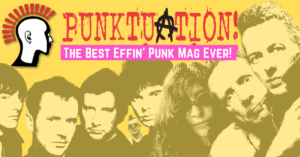In the latest instalment of her tour through musical influences that helped shape seminal punk albums, Molly Tie examines Rancid’s 1995 masterpiece.
Few modern punk bands inspire so much adulation and loyalty as Rancid. A career 30 years strong and still going, Rancid have always valued brotherhood and authenticity over any short-term commercial gains.
That is not to say that the band have not achieved the latter – they have sold over four million records worldwide making them one of the most successful independent punk rock groups of all time.
Each member has taken part in numerous successful side projects and they are collectively one of the most prolific collections of musicians going. And their biggest commercial success was their 1994 masterpiece ….And Out Come the Wolves which has cemented itself in our consciousness as a punk classic, packed to the rafters with three-minute bangers and putting Armstrong and Co. well and truly on the punk map ever since.
But what do we know about the recording of the album and what went into it? And what was its impact? Let’s revisit this 1995 classic…

It wasn’t just Green Day that burst through the glass ceiling for modern punk bands in the 1990 s- there was a flurry of pop-punk and ska activity following the gradual demise of grunge with bands such as Mighty Mighty Bosstones and Offspring all getting their big breaks and putting American alternative music on an exponential chart rise as well as the soundtrack to every teenage movie released in the decade.
But one band who had major labels (and therefore major funding) practically bang down their door was California ska-punk outfit Rancid. Featuring two members of Operation Ivy (Tim Armstrong and Matt Freeman) along with Lars Frederiksen and Brett Reed, Rancid brought grit, reality, and romance to this new wave of American punk.

…And Out Come the Wolves was Rancid’s third studio album, following their self-titled debut and 1994’s Let’s Go. The success of their first two albums, timed alongside a growing market for US pop-punk bands of Green Day and Offspring’s’ ilk, meant that Rancid found themselves at the centre of a bidding war between major record labels.
Around the same time that Green Day defected to Reprise for their 1994 smash Dookie, Rancid decided to stick with their beloved Epitaph Records (owned by Brett Gurewitz of Bad Religion fame). This decision exemplifies the code of honour that the band are staunch followers of, cementing a reputation as a band for whom integrity and longstanding friendships are prized. Tim Armstrong was stoic about the decision:
“Those bands [on Epitaph] have been my friends forever, and Brett has been my friend for a long time, so that’s why we stayed.”
He credits this decision as giving them the opportunity to completely focus on producing an album that was true to what they wanted to do as a band:
“Staying on Epitaph put so much fire in us, man. We went into this record caring about fucking nothing except the songs. And I love it because I think there’s an urgency there.”
Tweet
Tim Armstrong, Rancid
The decision to stick with Epitaph in no way altered the quality or critical adulation for the album. Three major hit singles were released from it- Roots Radicals, Time Bomb and Ruby Soho – showcasing different abilities of the band from oi pink style chanting, to ska/reggae grooves to more sentimental poignancy and melody. The album was certified gold in 1996 and made it to platinum by 2004. Because of the album’s success and acclaim, Rancid is considered part of the original cohort of bands that renewed interest in punk to the mainstream and a new generation.
….Wolves was released a mere 4 years after the band had formed in Albany, California and took only a few months to record between Fantasy Studios on their home turf of Berkeley and the prestigious Electric Lady Studios in New York.
Jerry Finn produced the album- an absolute lynchpin in the pop-punk scene of the ’90s, having been in the studio with a veritable who’s-who of ’90s punk royalty – Pennywise, Blink 182, Sum 41 and Alkaline Trio (sadly Finn passed away in 2008 after a heart attack). The resulting 19 tracks are tight, fun, and eloquent- a careful mix of 1970s punk energy and ethos, with modern stories to tell of life in early ’90s America when you’ve got no money but plenty of passion.
Rancid embody the image of street-wise punks with hearts of gold – not nihilistic and destructive but instead, active participants in their community where they still bounce around their old stomping grounds.
They always portray respect for the waifs and strays in their orbit – their songs tell stories that celebrate rather than patronise, and you get the impression that they’re still every bit a part of the community than they ever were and that’s how they like it.
Rancid’s look was to put them slightly on a limb as they harkened back to a more crust punk aesthetic rather than the look du jour that was leftover from the American hardcore days – jeans and t-shirts and a more simple, utilitarian look.
Rancid brought back the mohawks, chains, studs, and leather jackets that had been absent in the scene for a while and in looking like outsiders built an affinity in their fan base with everyone else who felt like an outsider themselves.
….Wolves is considered to be the strongest Rancid output amongst a solid discography. As such, it has a special place in the hearts of the ska/punk/rock/’90s, alternative consumers, all over the world and regularly makes lists of essential modern punk albums.
Quality songs, tight delivery, passion, and musicianship are all ingredients that make this album such a feast. The album has drawn many comparisons with The Clash’s London Calling, perhaps because of the presence of ska and reggae influences, and this comparison is something Armstrong has always been pretty chuffed about due to growing up listening to them:
“They were my biggest influence, and I’m still totally in love with their music. I know every one of their songs by heart, and I still think they made some of the greatest albums in rock history”.
Ska is the obvious feeder into the …Wolves album, numerous tracks including Timebomb and Daly City Train show the Rancid brand of a genre they love. Armstrong has built his reputation as a central part of the ska revival in the West Coast of America, the UK ’80s groups of the 2Tone era are a huge love of his.
Armstrong and Freeman’s band Operation Ivy became local legends after releasing their first couple of albums and their frequent shows at punk mecca The Gilman Street Project in California. Operation Ivy’s influence on a generation of bands that came out of that enclave- including rock superstars Green Day- is palpable.
Billie Joe Armstrong has said that the night he managed to get in to see Op Ivy play at Gilman Street changed his life and it is likely that this was the case for countless other young street punks who were inspired to start their own bands of the back of these local legends.
All Rancid members listened to ska and reggae growing up, with Frederiksen stating that he had a large group of skinhead friends who would spend hours listening to reggae together.
As well ska, the obvious contributor to the sound of the album is classic punk, and thanks to older brothers with impeccable tastes, the band grew up in their respective households listening to The Clash, The Dead Kennedys, the Circle Jerks, and other American hardcore groups. For Frederiksen, bands like Crass, Discharge and Subhumans gave him a thorough punk rock education:
“I was 11 years old, and these bands were screaming like it’s fuckin’ Armageddon”.

The album’s songs tell stories of street urchins, hardships, urban survival, and snatched moments of love and friendship. Individual anecdotes, scenes and novellas that paint the picture of a Bay Area that was a snapshot of a moment in time and built on the back of the band’s acquaintances and experiences.
Through the lyrics of songs such as Roots Radical, Time Bomb, and opener Maxwell Murder, you can see that Rancid (and in particular Armstrong) are fiercely observant of the community and landscape around them, chronicling life as they saw it, capturing it for posterity. The tales are specific and personal, reflecting real-life experiences- a move away from general teen angst or working-class travails that some other groups were writing about.
Their follow up albums 1998’S Life Won’t Wait, and 2003’s Indestructible dealt overwhelmingly with Armstrong’s relationship and then divorce from The Distiller’s Brody Dalle, ….Wolves was outward-looking but still with a sentiment- songs like single Ruby Soho and Olympia, WA deal with love and loss issues – the latter track being about Armstrong’s relationship with Bikini Kill’s Tobi Vail.
Now 25 years since the release, it has lost none of its appeal, relevance, or magic. Since its release, doors continued to open for similar bands from the scene – Reel Big Fish, Suicide Machine and Armstrong’s proteges The Interrupters all benefitting from the success of Armstrong, Frederiksen, Freeman and Reed (replaced by Branden Steineckert in 2007).

Perhaps part of the glue that keeps the band together (they are still recording, and a new album is due potentially this year) is the fact they are all able to flex their creative muscles with numerous side projects and bands.
Armstrong has been part of hip hop/rock supergroup The Transplants; producing for bands like The Interrupters and Mighty Mighty Bosstones; Lars has toured extensively with band Old Firm Casuals and Freeman has been exploring a more metal sound with band Charger.
The key reason for Rancid’s longevity and adulation amongst fans is their ability to deliver catchy, accessible punk/ska tunes without feeling like they have compromised their own integrity either personally or creatively.
Although not setting out to make a hit record, the success of label mates Offspring (with Smash) and Green Day (with Dookie) must have piled on the expectations and the tenacity to dream that the album would cement their career as professional punks must have been too tempting to deny.
For the band, it was a record they could be proud of for so many reasons, as bassist Matt Freeman put it:
“I think the third record is the quintessential Rancid record in a lot of ways, just because us four really gelled as a band. We’ve grown up, we play better now, and I think that’s what came out.”
Need more Rancid?
If you enjoyed this, you might like…
I’m Molly Tie- I Love punk! I play drums (badly), write a lot about punk (not as badly) and I’m particularly interested in issues relating to women in the music scene.







 Did you know that we are 100% DIY? We run our own game. No one dictates to us, and no one drives what we can or cannot put on our pages – and this is how we plan to continue!
Did you know that we are 100% DIY? We run our own game. No one dictates to us, and no one drives what we can or cannot put on our pages – and this is how we plan to continue!
